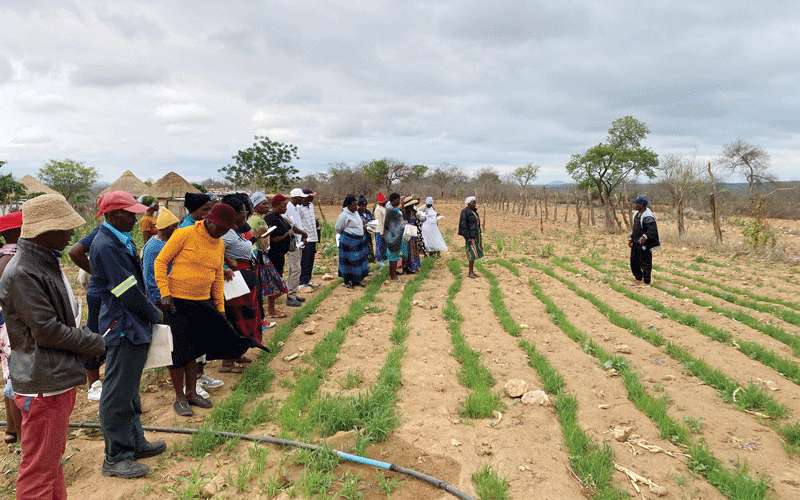
At the heart of Zimbabwe’s semi-arid lands, where droughts are becoming more frequent and rainfall unpredictable, Abimelek Mutsenure’s farm stands as a beacon of hope for others struggling to adapt to the effects of climate change.
Since arriving in Shashe in 2000 at the height of the land reform programme, Mutsenure (65) has transformed his 16-hectare piece of land to a model of resilience and sustainable farming.
“We have always been conscious about working with nature,” he said.
“When we came here, the land was mostly a forest and we were careful not to destroy the environment.
“We wanted to ensure that the land could continue to sustain us without depleting the resources.”
Today, Mutsenure’s farm is divided into three key sections, co-production area, grazing space for livestock, and a woodlot to preserve the natural vegetation.
It is this thoughtful approach to land management that has earned him recognition as a “House of Resilience” by agroecology practitioners in the region.
The power of agroecology in challenging times
- Village Rhapsody: In Zimbabwe poverty is biting the poor the most
- Zim maize output to drops by 43%
- Village Rhapsody: In Zimbabwe poverty is biting the poor the most
- Zim maize output to drops by 43%
Keep Reading
In recent years, climate change has wreaked havoc on Zimbabwe’s agriculture.
According to a 2023 report by the Food and Agriculture Organisation (FAO), more than 60% of the country’s farmers are facing severe losses due to droughts, erratic rainfall and the growing prevalence of pests and diseases.
These changes are disproportionately affecting smallholder farmers, particularly those who rely on traditional, non-resilient farming techniques.
But, Mutsenure’s farm tells a different story.
The key to his success lies in employing agroecological practices, a sustainable farming approach that prioritises environmental health, biodiversity and soil fertility over chemical inputs and monoculture farming.
“We didn’t just clear the land without thought,” he told NewsDay.
“We practised conservation techniques from the beginning, starting with contour farming, which helps to prevent soil erosion and water runoff.
“By doing this, we could keep the moisture in the soil even during dry spells.”
Mutsenure also adopted upland conservation practices, where stone structures are built to control water flow and protect the soil.
This effort, alongside mulching and composting, has ensured that the water table remains healthy and soil fertility is maintained even during drought years.
Agroecology’s benefits during droughts
This year’s drought has been a harsh reminder of the growing challenges farmers face in Zimbabwe.
As reported by the Zimbabwe Vulnerability Assessment Committee (ZimVac), over 2,4 million people across the country are facing food insecurity, exacerbated by below-average rainfall and reduced agricultural yields.
While many farmers in the region, who planted conventional crops like maize, saw their harvests fail, Mutsenure’s agroecological approach yielded better results.
“All the farmers, who grew maize this season, didn’t harvest anything. But those who grew, drought-resistant crops like rapoko, pomegranate and sorghum were able to harvest,” Mutsenure said.
“Even in the harshest conditions, we had food. The agroecological practices really made a difference.”
Through agroecology, Mutsenure has not only secured food for his family, but also ensured that his community can exchange seeds and knowledge through local food and seed fairs.
“Before agroecology, we struggled to find seeds. Now, we have our own seeds, we share them and we don’t have to rely on purchasing expensive hybrid seeds that often fail.”
Learning from each other, the importance of farmer-to-farmer exchanges
In an effort to promote sustainable farming practices, Zimbabwe Smallholder Organic Farmers Forum (ZIMSOFF) hosted a farmer-to-farmer learning exchange visit to Shashe Agroecology School, providing a platform for farmers from different regions to share knowledge and experiences in agroecology.
The initiative drew attention to its potential to address climate change, improve livelihoods and combat food insecurity across rural Zimbabwe.
Christopher Chinyoka, a field officer working with ZIMSOFF, says farmer-to-farmer exchanges are transformative.
“Agroecology has proven to be a solution to climate change. We’re not just teaching these farmers, we’re allowing them to see the practices in action,” Chinyoka said.
“When you see another farmer succeed, it inspires you to make changes in your own community.”
The exchange focuses on practical agroecology principles, including aquaculture, bee keeping, permaculture, crop production and small livestock keeping.
Shashe’s centres of excellence have become a model for other farmers, showcasing how sustainable techniques can boost food security and improve local economies.
Farmers visiting Shashe’s centres are particularly motivated by the visible success stories.
“Many farmers initially think that agroecology is too labour-intensive or costly. But once they see other farmers succeeding with the same practices, they feel more empowered,” Chinyoka explained.
“Through the exchange, local farmers have learned innovative water conservation techniques, such as rainwater harvesting systems, soil preservation practices, and crop diversification methods.
“These techniques are already transforming their livelihoods. We are seeing farmers here selling vegetables, fish and fruits in local markets. They’re generating income and improving their standard of living.”
One of the key initiatives helping farmers like Mutsenure, who share their knowledge and learn from others, is the farmer-to-farmer learning exchange, a programme that brings together farmers from various regions to exchange best practices and ideas on agroecology.
“The importance of this exchange is huge. It’s where we can share knowledge and sharpen each other’s skills,” Mutsenure said.
“We have seen farmers from different parts of the country, each with their own unique challenges and we all share how we are tackling climate change through agroecology.”
This exchange has been critical in building resilience across communities, as farmers learn how to adapt and apply sustainable practices suited to their local environments.
“We have learned new techniques to conserve water, manage our soils and improve crop yields in a sustainable way,” Mutsenure added.
“And now we are teaching others so they can do the same in their areas.”
ZIMSOFF works in rural areas in Zimbabwe and its national reach is realised through the organisation of regional clusters of local farmers’ organisations.
In each cluster households are organised in groups/clubs.
A number of these form a community of practice which in other words is called Smallholder Farmer Organisation (SFO) and a number of these form a cluster.
There are four clusters with over 19 000 members, namely the central cluster covering Masvingo and Midlands provinces, the eastern cluster covering Manicaland, the northern cluster covering Mashonaland East, West and Central and the western cluster covering Matabeleland North and South.
Each cluster has an average of 15 SFOs with varying membership.
ZIMSOFF is an active founding partner of the Zimbabwe Seed Sovereignty Programme, an alliance of seven Zimbabwean civil society organisations working towards greater seed sovereignty in Zimbabwe.
There were over 30 farmers at the exchange programme, who came from different clusters, they all expressed gratitude for what they had learnt and seen.
Eddington Vambe, a 19-year-old ZIMSOFF farmer from Juru SFO under Murewa, said: “From what I learnt here in Shashe, I have noted that agroecology is the way to go.
“I have grasped the importance of conserving water, using contour ridges, where I noted that all the runoff from rains is stored in ridges instead of flowing away.”
Another farmer, Sphiwe Ngwenya (59) from Nkayi district, said the ZIMSOFF exchange initiative had “equipped me with knowledge that the crops we grow bring about a variety of nutrients, since we no longer feed our soils with fertilisers, but instead, we use natural manure like cow dung, tree leaves and more. This, however, also leaves our soils rich and healthy.”
According to ZIMSOFF, its focus is to do farming in harmony with mother earth as climate change is real but if communities take care of their natural resources they and future generations will benefit.






